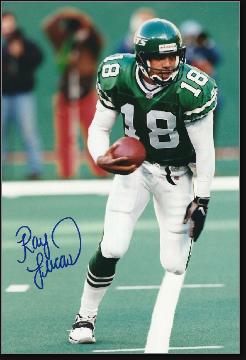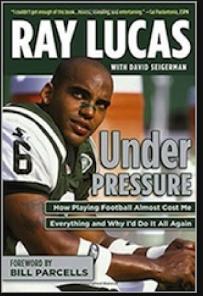|

Ray Lucas
Sport: Football
Born: August 6, 1972
Town: Harrison
Raymond J. Lucas was born August 6, 1972 in Harrison. His mother had Ray with another man, an African-American, while Ray’s father, Tom, was serving in Vietnam. Tom returned to the States, married Ray’s mother and raised him as his son. Ray was big, quick and smart. In a town where sports was a major focus, Ray was one of the best young athletes anyone could remember.
Ray enrolled at Harrison High School in 1987 and soon became the star of the basketball and football teams. He also met his wife, Cecila, at Harrison High. Ray had the college scouts drooling as a senior. He passed for nearly 1,000 yards, ran for over 500 and accounted for 98 of the Blue Tide’s 128 points to earn All-State honors.
Rutgers coach Doug Graber won the recruiting war, and staying close to home proved to be the right move for Ray. He was the perfect QB for the Scarlet Knights’ smash-mouth offensive style. After red-shirting in 1991, Ray split time in 1992 with transfer QB Bryan Fortay, as Rutgers went 7–4. His first start produced a gutsy 13–9 win over West Virginia in which he completed 15 passes for 191 yards. By the end of the year the starting job was his. He had a solid sophomore year, followed by a junior campaign in which he threw for 1,869 yards, ran for 276 more and tied the school mark for TD passes.
Ray’s senior season saw him lead all Big East players with 223.3 yards of total offense per game. He threw for 2,180 yards and ran His favorite target was tight end Marco Battaglia. Ray graduated as the Scarlet Knights’ all-time leader with 43 touchdown passes.
Ray did not project as a prototypical NFL quarterback. His arm was below average and he was a little to eager to leave the pocket and take his chances in the open field. He went undrafted in 1996, but drew interest from teams intrigued by his physical skills and his heart. When he signed as a backup with the Patriots, he vowed to work his way into the starting lineup, and began consuming knowledge voraciously, waiting for his chance. In the meantime, he contributed on special teams, busting up kickoff returns for the Pats, who made it to the Super Bowl.
Ray was a favorite of New England coach Bill Parcells, who brought him to New York when he took the Jets’ job  in 1997. In 1999, Ray got a chance to start after Vinny Testaverde was injured in mid-November. With Ray at the helm, the Jets 6 of their final 8 games to finish 8–8. One of the losses was a shootout against the Giants in which Ray threw four TD passes. Ray completed 161 of 272 passing attempts on the year, with 14 touchdowns and just 6 interceptions. He also ran for 144 yards and a touchdown. He became one of the all-time favorites of Jets fan that season. in 1997. In 1999, Ray got a chance to start after Vinny Testaverde was injured in mid-November. With Ray at the helm, the Jets 6 of their final 8 games to finish 8–8. One of the losses was a shootout against the Giants in which Ray threw four TD passes. Ray completed 161 of 272 passing attempts on the year, with 14 touchdowns and just 6 interceptions. He also ran for 144 yards and a touchdown. He became one of the all-time favorites of Jets fan that season.
The arrival of Chad Pennington in 2000 made Ray expandable. He played his final two seasons as a pro for the Miami Dolphins in 2001 and 2002. He started six times for the Dolphins in ’02. He tried to make the Ravens in 2003 but was cut in camp. Ray never shied away from contact as a pro and suffered multiple injuries to his neck, back and shoulders. He left the NFL hooked on painkillers.
Ray’s battle with addiction—and ultimate recovery—was a public one, covered on TV and in the New York papers. In 2014, he wrote a book entitled Under Pressure: How Playing Football Almost Cost Me Everything and Why I’d Do It All Again. Ray went into broadcasting and became one of the voices of Rutgers football. He also worked as a TV analyst for the Jets pre- and post-game shows on SportsNet. In 2008, he was inducted into the Hudson County Sports Hall of Fame and in 2017, he was inducted into the Rutgers Athletic Hall of Fame.
|
|
|